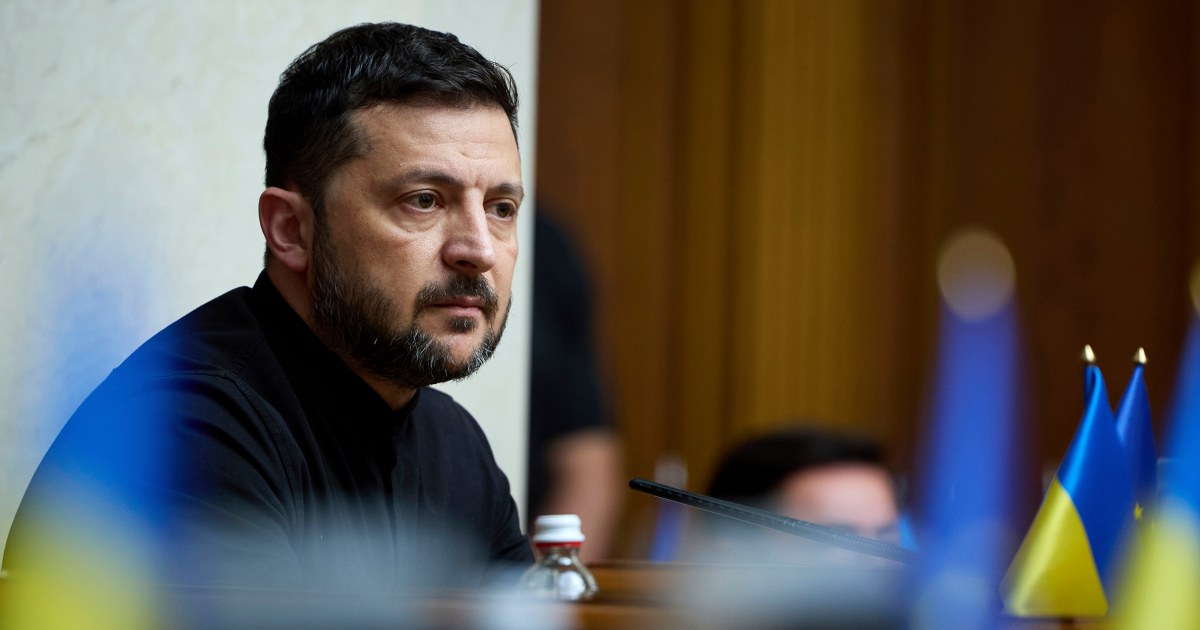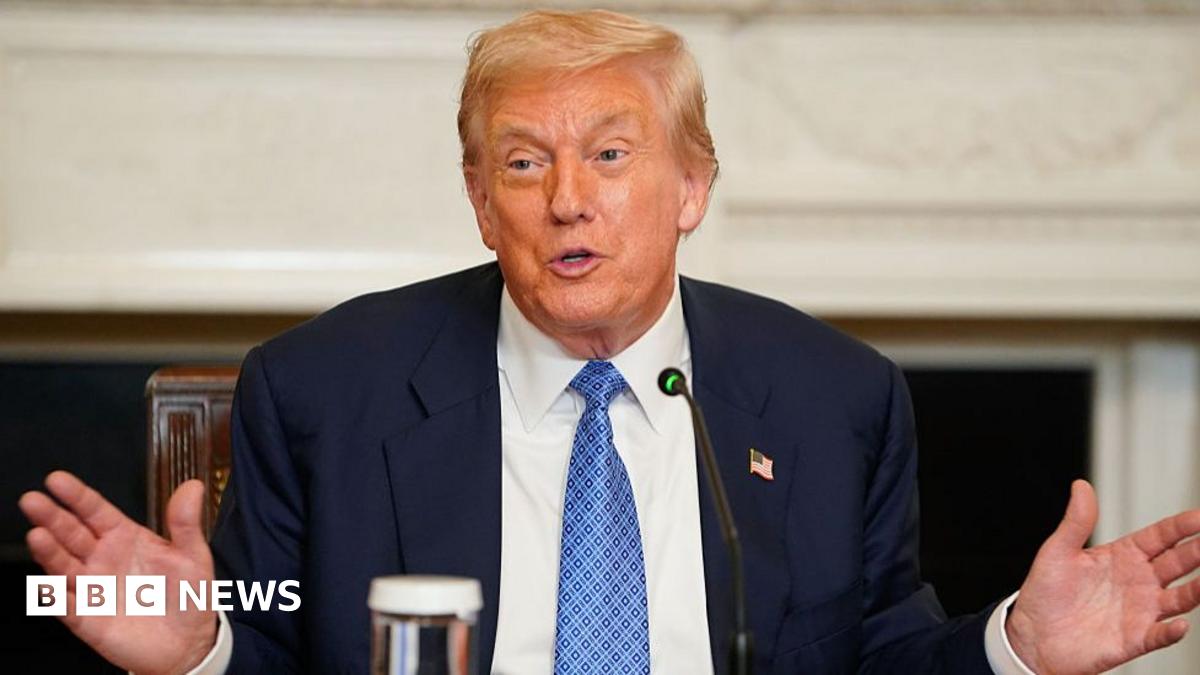Trump-Putin Meeting Could Impact U.S.-European Relations

Introduction
As President Trump prepares to meet with Russian leader Vladimir Putin, European leaders are expressing concerns about their lack of input into the highly-anticipated meeting. This comes after Trump's recent shift towards NATO and their stance on Ukraine, causing some uncertainty about the direction of U.S.-Russia relations.
Key Details
Some European leaders are worried that Trump's recent alignment with NATO may not hold up during his meeting with Putin, as the president has been known to change his stance on international issues. This meeting will also serve as a test for Trump's commitment to NATO and their stance on Ukraine.
In addition, some European leaders fear that Trump may make concessions to Putin without consulting them, potentially weakening their relationship with the U.S. and leaving them out of important discussions.
Impact
The outcome of Trump's meeting with Putin could have a significant impact on U.S.-European relations and the overall balance of power in the region. If Trump makes significant concessions to Putin without consulting European leaders, it could strain the transatlantic relationship and create further divisions between the U.S. and its allies.
Furthermore, the lack of European input in the meeting could also undermine their confidence in the U.S. as a reliable ally, potentially causing them to seek other partnerships and alliances in the future.
About the People Mentioned
Donald Trump
Donald John Trump, born June 14, 1946, in Queens, New York, is an American businessman, media personality, and politician. He graduated from the University of Pennsylvania’s Wharton School in 1968 with a degree in economics. In 1971, he took over his family’s real estate business, renaming it the Trump Organization, through which he expanded into building and managing skyscrapers, hotels, casinos, and golf courses. Trump gained widespread fame as the host of the reality TV show *The Apprentice* from 2004 to 2015, which helped establish his public persona as a successful entrepreneur. Trump entered politics as a Republican and was elected the 45th president of the United States, serving from 2017 to 2021. His presidency was marked by significant policy actions including tax cuts, deregulation, the appointment of three Supreme Court justices, renegotiation of trade agreements (notably replacing NAFTA with the USMCA), and a focus on immigration control including border wall expansion. He withdrew the U.S. from international agreements such as the Paris Climate Accord and the Iran nuclear deal, and engaged in a trade war with China. His administration’s response to the COVID-19 pandemic was criticized for downplaying the virus’s severity. Trump was impeached twice by the House of Representatives—first in 2019 for abuse of power and obstruction, and again in 2021 for incitement of insurrection—but was acquitted by the Senate both times. After losing the 2020 election to Joe Biden, Trump challenged the results, culminating in the January 6, 2021, Capitol riot. He remains a central figure in American politics, having won the 2024 presidential election and returned as the 47th president in 2025, continuing to promote policies aimed at economic growth, border security, and military strength[1][2][3][4].
Vladimir Putin
Vladimir Putin is the current President of Russia, a position he has held for multiple terms since 2000, with a brief interlude as Prime Minister from 2008 to 2012[1][3]. Born in Leningrad (now Saint Petersburg) in 1952, Putin began his career in the Soviet Union’s security services, joining the KGB in 1975 and rising to the rank of Lieutenant Colonel by the time he left in 1991, following postings in East Germany and Leningrad[4]. After the Soviet Union’s collapse, he transitioned into politics, serving as an adviser to Saint Petersburg Mayor Anatoly Sobchak and later moving to Moscow, where he held various administrative roles under President Boris Yeltsin[6]. Putin was appointed Prime Minister in August 1999 and became acting President when Yeltsin unexpectedly resigned that December[3][6]. He won his first presidential election in March 2000, promising to stabilize Russia’s economy and political system after the tumultuous 1990s[3][7]. During his initial terms, he centralized power, reasserted federal control over Russia’s regions, and curtailed the influence of the country’s oligarchs through legal and economic measures[7]. Putin was re-elected in 2004 but, due to constitutional term limits, stepped aside in 2008, becoming Prime Minister under his successor Dmitry Medvedev, while retaining significant influence[3]. Constitutional amendments later extended presidential terms, and Putin returned to the presidency in 2012[1]. Putin’s time in office has been marked by assertive foreign policy, including military interventions in Syria in support of President Bashar al-Assad and the 2014 annexation of Crimea, which led to international sanctions[1]. Domestically, his tenure has seen increased state control over media, the suppression of political opposition, and constitutional changes consolidating executive authority[1]. In 2022, Russia’s full-scale invasion of Ukraine triggered a major international crisis, further isolating Russia from the West and prompting widespread condemnation[1]. As of 2025, Putin remains a dominant figure in Russian politics, having secured another term in office through constitutional changes that allow him to potentially remain president until 2036[1]. His leadership continues to shape Russia’s domestic trajectory and its role in global affairs, amid ongoing conflict in Ukraine and strained relations with NATO and Western countries[1].
About the Organizations Mentioned
NATO
The **North Atlantic Treaty Organization (NATO)** is a transatlantic military alliance founded in 1949 to secure peace in Europe and protect democratic nations from Soviet aggression. It began with 12 founding members and has expanded to include 32 countries across North America and Europe as of 2025, including recent additions Finland (2023) and Sweden (2024)[1][3]. NATO's core principle is collective defense, meaning an attack against one ally is considered an attack against all, enshrined in Article 5 of its founding treaty[3]. Originally established as a Cold War bulwark, NATO has evolved beyond its initial Euro-Atlantic focus, engaging in missions worldwide, such as in Afghanistan and Libya[1]. The alliance remains central to U.S.-Europe military cooperation and has adapted to new security challenges, particularly Russia’s 2022 invasion of Ukraine, which has significantly reshaped NATO’s priorities. This aggression has spurred increased defense spending, stronger collective deterrence efforts, and accelerated Ukraine’s path toward potential membership[1][4]. In June 2025, NATO held its first summit in the Netherlands, where leaders agreed on raising defense spending targets to 5% of GDP—split between 3.5% for core defense and 1.5% for related security costs, including support for Ukraine. This marked a historic commitment to bolster the alliance’s military capabilities amid evolving global threats. The summit also emphasized eliminating defense trade barriers and reaffirmed the ironclad commitment to collective defense[2][5]. NATO’s ongoing significance lies in its role as a strategic security platform fostering cooperation among member states, responding to geopolitical instability, and adapting to emerging threats like terrorism and cyber warfare[4]. Its "open door" policy continues to invite eligible European democracies to join, reinforcing its mission to safeguard peace, democracy, and shared technological and defense innovations across allied nations[1][4].
U.S.
The term "U.S." typically refers to the United States government, a complex federal organization established by the Constitution to govern the country through three branches: legislative, executive, and judicial. This separation of powers ensures a system of checks and balances to prevent any one branch from gaining too much control[1][3][8]. **What the U.S. government does:** The government is responsible for creating and enforcing laws, conducting foreign policy, managing national defense, administering justice, and providing public services across diverse sectors including health, education, and infrastructure. It operates through multiple agencies and departments that implement policies and programs affecting citizens’ daily lives[3][6]. **History:** Founded in 1789, the U.S. government’s structure is rooted in the Constitution, which created a federal system balancing power between national and state authorities. Over more than two centuries, it has evolved to meet changing political, social, and technological challenges, exemplified by the enduring publication of the *United States Government Manual* since the New Deal era[3][9]. **Key achievements:** The U.S. government has played a critical role in shaping global democracy, promoting civil rights, pioneering technological innovation, and fostering economic growth. Landmark legislation and executive actions have addressed healthcare reform, environmental protection, and technological advancement. Recent administrations continue to impact sectors like technology, health, and taxation through executive orders and budget reconciliation processes[4][5]. **Current status:** As of 2025, the U.S. government remains a vast and multifaceted institution with approximately thousands of state and local government units documented by the Census Bureau, reflecting its scale and complexity[2]. Contemporary challenges include adapting governance to rapid technological changes, maintaining public trust, and managing policy across federal and state lines. **Notable aspects:** The government’s commitment to transparency is demonstrated through publicly accessible resources like the *Government Manual* and detailed organizational charts. Its federal structure facilitates responsive governance while balancing power through constitutional check
European Leaders
The **European Leadership Network (ELN)** is an independent, non-partisan pan-European think tank focused on enhancing security across Europe through cooperative dialogue, research, and policy advocacy[1][2][9]. Founded in 2011 as part of the Nuclear Security Project, the ELN initially concentrated on nuclear disarmament inspired by President Obama’s 2009 Prague speech but soon expanded its remit to broader foreign, defense, and security challenges affecting the continent[1][2]. Headquartered in London, the ELN unites over 450 current, former, and emerging European leaders from political, military, business, and diplomatic backgrounds, creating a unique network that leverages high-level expertise and cross-border cooperation to address existential threats to European security[1][9]. This network-driven approach allows the ELN to influence security policy effectively through its rigorous research publications, strategic events, and media engagement[1]. **Key achievements** include receiving recognition such as the 2015 Nunn-Lugar Award for Promoting Nuclear Security, awarded to its chair, Lord Des Browne, and former Russian Foreign Minister Igor Ivanov, reflecting its impact on nuclear security dialogue[2]. The ELN has also secured philanthropic support, such as a two-year funding grant from the Carnegie Corporation in 2015, which underpinned its work on complex security issues[2]. In recent years, the ELN has tackled critical risks like the erosion of European cohesion, dangers of unintended conflict, challenges posed by emerging military technologies, and the decline of arms control dialogue[1]. Despite its constructive role, in 2025, the ELN was declared an undesirable organization by Russia, underscoring its contentious position amid geopolitical tensions[2]. Overall, the ELN stands out as a **highly influential European security network and think tank**, dedicated to pragmatic, multilateral solutions aimed at preserving peace and stability in an increasingly complex geopolitical landscape[1][2][9]. Its blend of experienced leadership

















